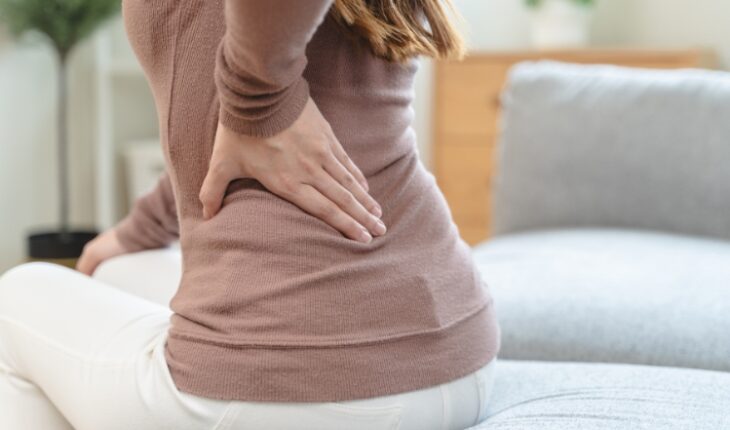Behind the Burden: Rheumatologist Highlights the Hidden Toll of Caregiving on Joint Health and Well-being
New survey insights reveal the far-reaching impact caregiving can have on physical and mental well-being, with over half (54%) of caregivers reporting weekly back, joint or muscle pain, and 1 in 5 (19%) experiencing daily stress or anxiety.[i] As Carers Awareness Week (9–15th June) approaches, experts are urging greater awareness of how caregivers can support and prioritise their own health. Dr Rod Hughes shares his tips to help cope.
There are approximately 4.7 million unpaid carers in the UK,[ii] defined as those who provide unpaid care for someone who is ill, disabled, older, has mental health issues or struggles with addiction. However, this figure excludes the many who regularly care for children, neighbours or friends and family needing support beyond the traditional definitions. Carers UK estimates that the number of unpaid carers could be as high as 10.6 million, highlighting a significant lack of personal and societal recognition of what it truly means to provide care.[iii]
A new survey, commissioned by GOPO® Joint Health – a leading supplement proven to reduce pain and stiffness and improve mobility – polled 1,001 self-defined caregivers. The findings reveal the true impact of caregiving on mental, emotional and physical health.
Over one-third (37%) have experienced significant strain, discomfort or injury to their joints as a result of assisting or lifting the person they care for, and almost half (47%) frequently endure persistent aches, stiffness or pain that lingers long after caregiving tasks.i As a result, one-third (32%) rely heavily on pain medication, putting their own long-term health at risk.
The mental toll of caregiving is profound, with almost half (46%) of caregivers feeling emotionally drained by the relentless stress it brings. One in seven (13%) rely on support services for their well-being, while nearly half (44%) experience loneliness or isolation at least once a week, often facing the demands of caregiving alone.
Despite these challenges, almost half (49%) of respondents cannot remember the last time they practiced self-care, admitting that their own needs always come last.i While caregivers devote themselves to others, acknowledging the importance of self-care, and setting aside time for their own well-being is vital.
Dr Rod Hughes, a highly esteemed rheumatologist with over 20 years of clinical expertise, comments:
“Caregiving is an invaluable role, but it can take a significant toll on the carer’s health, particularly when it comes to joint and musculoskeletal well-being. The physical demands of caregiving, from assisting with mobility to prolonged periods of standing or lifting, can lead to increased strain on the joints and a higher risk of musculoskeletal pain. To ensure carers can continue providing the best possible support, it is crucial they prioritise their own health and well-being. By maintaining joint health, managing stress and incorporating self-care practices, carers can sustain their ability to provide care in the long run.”
Dr Rod Hughes provides his top tips to support caregivers’ health and well-being:
Protect your joint health: “Caregiving often involves repetitive movements, heavy lifting, and prolonged periods of strain on the joints. To prevent long-term damage, ensure you are using proper lifting techniques, maintaining good posture and incorporating gentle exercises such as stretching or low-impact activities to support joint mobility. Supplements containing the galactolipid GOPO, derived from rose-hips, have been shown in clinical research to help maintain joint health and reduce joint pain naturally.”
Prioritise self-care: “To continue supporting others, it’s vital to care for yourself first. Just like the safety advice on an aeroplane – put on your own oxygen mask before helping others. While caregiving can feel all-consuming, taking time to care for yourself is essential. Schedule short breaks throughout the day, even if it’s just 5-10 minutes for a moment of relaxation, reading or stretching. Self-care is not a luxury; it is necessary to maintain both physical and mental health.”
Manage stress and build resilience: “Long-term caregiving can be mentally and emotionally exhausting. To help manage stress and prevent burnout, incorporate relaxation techniques such as mindfulness, deep breathing or meditation into your routine. Finding ways to recharge emotionally can improve overall well-being and help carers remain strong in their role.”
Stay connected and seek support: “Carers often feel isolated, but staying connected with others can provide much-needed emotional and practical support. Whether through in-person groups, online forums or virtual coffee chats, sharing experiences with fellow carers can help reduce loneliness and create a sense of community. Seeking support from friends, family or professional networks can also help lighten the burden and provide reassurance that you are not alone.”
Extensive studies involving over 400 patients with chronic pain conditions, such as osteoarthritis, have shown that GOPO® produces significant and consistent pain relief and improved joint function. In one study, 8 out of 10 patients reported a significant reduction in pain after just 3 weeks of GOPO®.[iv]
GOPO® Joint Health is available from Boots, Amazon, and independent chemists and retailers nationwide. Visit www.gopo.co.uk for further information.
[i] GOPO® Joint Health survey on 1,001 caregivers in the UK. January 2025.
[ii] The Kings Fund. 2024. What are unpaid carers, who are they and how often do they provide care? Available at: https://www.kingsfund.org.uk/insight-and-analysis/data-and-charts/unpaid-carers-nutshell#:~:text=According%20to%20the%202021%20Census,females%20from%20the%202011%20Census. (Accessed: January 2024).
[iii] Carers UK. 2023. Annual Report 2022-2023. Available at: https://www.carersuk.org/media/ynfpnjwk/carers-uk-annual-report-22_23 (Accessed: January 2025).
[iv] Winther, K et al. “A powder made from seeds and shells of a rose-hip subspecies (Rosa canina) reduces symptoms of knee and hip osteoarthritis: a randomized, double-blind, placebo-controlled clinical trial.” Scandinavian journal of rheumatology vol. 34,4 (2005)
[v] Rein E, Kharazmi A, Winther K. A herbal remedy, Hyben Vital (stand. Powder of a subspecies of Rosa canina fruits), reduces pain and improves general wellbeing in patients with OA – a double-blind, placebo-controlled, randomised trial. Phytomedicine 2004.
[vi] Christensen R et al. Does the hip powder of Rose canina (rosehip) reduce pain in osteoarthritis patients? – a meta-analysis of randomised controlled trials, Osteoarthritis Cartilage (2008)
[vii] Schwager J, Richard N, Wolfram S. Anti-inflammatory and chondro-protective effects of rosehip powder and its constituent galactolipids GOPO Poster presentation at the World Congress of Osteoarthritis (OARSI) 2008
- Long hospital stays reach worst levels this winter - 6th February 2026
- 1960s Men’s Gym - 6th February 2026
- NHS trials low impact sleep apnoea device - 6th February 2026







